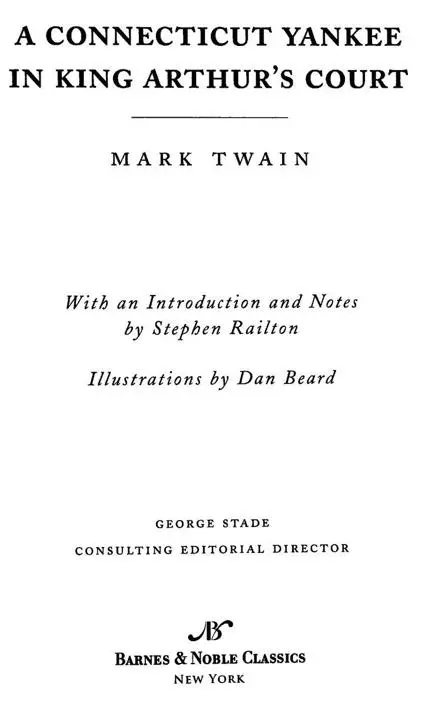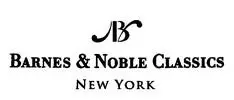- The Tragedy of the Manor-House.
CHAPTER XXXI. - Marco.
CHAPTER XXXII. - Dowley’s Humiliation.
CHAPTER XXXIII. - Sixth Century Political Economy.
CHAPTER XXXIV. - The Yankee and the King Sold as Slaves.
CHAPTER XXXV. - A Pitiful Incident.
CHAPTER XXXVI. - An Encounter in the Dark.
CHAPTER XXXVII. - An Awful Predicament.
CHAPTER XXXVIII. - Sir Launcelot and Knights to the Rescue.
CHAPTER XXXIX. - The Yankee’s Fight with the Knights.
CHAPTER XL. - Three Years Later.
CHAPTER XLI. - The Interdict.
CHAPTER XLII. - War!
CHAPTER XLIII. - The Battle of the Sand-Belt.
CHAPTER XLIV. - A Postscript by Clarence.
ENDNOTES
INSPIRED BY
COMMENTS & QUESTIONS
FOR FURTHER READING
FROM THE PAGES OF
A CONNECTICUT YANKEE IN KING ARTHUR’S COURT
“I shall never see my friends again—never, never again. They will not be born for more than thirteen hundred years yet.” (page 30)
“Merlin has wrought a spell! Merlin, forsooth! That cheap old humbug, that maundering old ass? Bosh, pure bosh, the silliest bosh in the world! Why, it does seem to me that of all the childish, idiotic, chuckle-headed, chicken-livered superstitions that ev—oh, damn Merlin!” (pages 52-53)
To return to my anomalous position in King Arthur’s kingdom. Here I was, a giant among pigmies, a man among children, a master intelligence among intellectual moles: by all rational measurement the one and only actually great man in that whole British world; and yet there and then, just as in the remote England of my birth-time, the sheep-witted earl who could claim long descent from a king’s leman, acquired at second-hand from the slums of London, was a better man than I was. (page 83)
There never was such a country for wandering liars; and they were of both sexes. (page 103)
Concentration of power in a political machine is bad; and an Established Church is only a political machine; it was invented for that; it is nursed, cradled, preserved for that; it is an enemy to human liberty. (page 176)
There is no accounting for human beings. (page 219)
Intellectual “work” is misnamed; it is a pleasure, a dissipation, and is its own highest reward. The poorest paid architect, engineer, general, author, sculptor, painter, lecturer, advocate, legislator, actor, preacher, singer, is constructively in heaven when he is at work. (page 298)
“There is that about earthly pomps which doth ever move to reverence.” (page 335)
“The law is clear: it doth not require the claimant to prove ye are slaves, it requireth you to prove ye are not.” (page 366)
“Dreams that were as real as reality—delirium, of course, but so real!” (page 467)


Published by Barnes & Noble Books 122 Fifth Avenue
New York, NY 10011
www.BookishMall.com.com/classics
A Connecticut Yankee in King Arthur’s Court was first published in 1889.
Published in 2005 by Barnes & Noble Classics with new Introduction, Notes, Note on the Illustrations, Biography, Chronology, Inspired By,
Comments & Questions, and For Further Reading.
Introduction, Notes, A Note on the Illustrations, and For Further Reading
Copyright © 2005 by Stephen Railton.
Note on Mark Twain, The World of Mark Twain and A Connecticut Yankee in King
Arthurs Court, Inspired by A Connecticut Yankee in King Arthur’s Court, and
Comments & Questions
Copyright © 2005 by Barnes & Noble, Inc.
All rights reserved. No part of this publication may be reproduced or transmitted in any form or by any means, electronic or mechanical, including photocopy, recording, or any information storage and retrieval system, without the prior written permission of the publisher.
Barnes & Noble Classics and the Barnes & Noble Classics colophon are trademarks of Barnes & Noble, Inc.
A Connecticut Yankee in King Arthur’s Court
ISBN-13: 978-1-59308-210-9 ISBN-10: 1-59308-210-X
eISBN : 978-1-411-43199-7
LC Control Number 2005922118
Produced and published in conjunction with:
Fine Creative Media, Inc.
322 Eighth Avenue
New York, NY 10001
Michael J. Fine, President and Publisher
Printed in the United States of America
QM
3 5 7 9 10 8 6 4
MARK TWAIN
Mark Twain was born Samuel Langhorne Clemens on November 30, 1835. When Sam was four years old, his family moved to Hannibal, Missouri, a small town later immortalized in The Adventures of Tom Sawyer and Adventures of Huckleberry Finn. After the death of his father, twelve-year-old Sam quit school and supported his family by working as a delivery boy, a grocer’s clerk, and an assistant blacksmith until he was thirteen, when he became an apprentice printer. He worked for several newspapers, traveled throughout the country, and established himself as a gifted writer of humorous sketches. Abandoning journalism at points to work as a riverboat pilot, Clemens adventured up and down the Mississippi, learning the 1,200 miles of the river.
During the 1860s he spent time in the West, in newspaper work and panning for gold, and traveled to Europe and the Holy Land; The Innocents Abroad (1869) and Roughing It (1872) are accounts of those experiences. In 1863 Samuel Clemens adopted a pen name, signing a sketch as “Mark Twain,” and in 1867 Mark Twain won fame with the publication of a collection of humorous writings, The Celebrated Jumping Frog of Calaveras County and Other Sketches. After marrying and settling in Connecticut, Twain wrote his best-loved works: the novels about Tom Sawyer and Huckleberry Finn, and the nonfiction work Life on the Mississippi. Meanwhile, he continued to travel and had a successful career as a public lecturer.
In his later years, Twain saw the world with increasing pessimism following the death of his wife and two of their three daughters.
1 comment